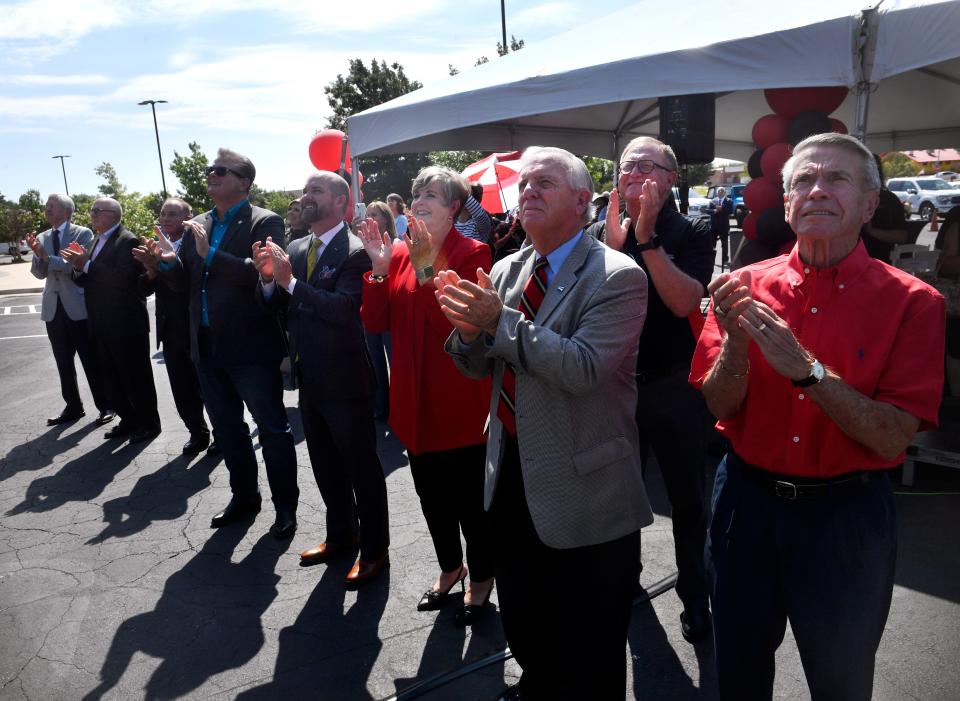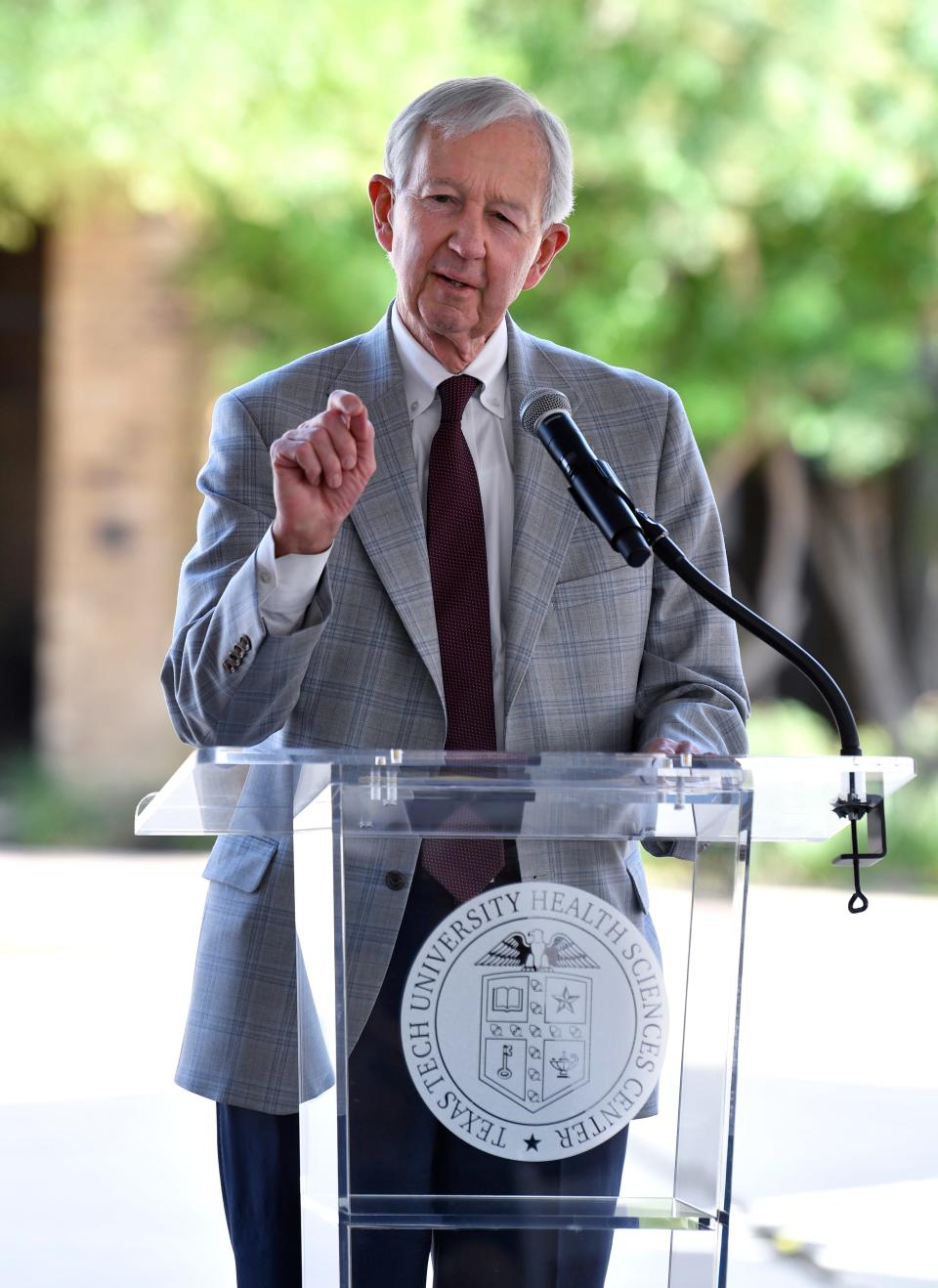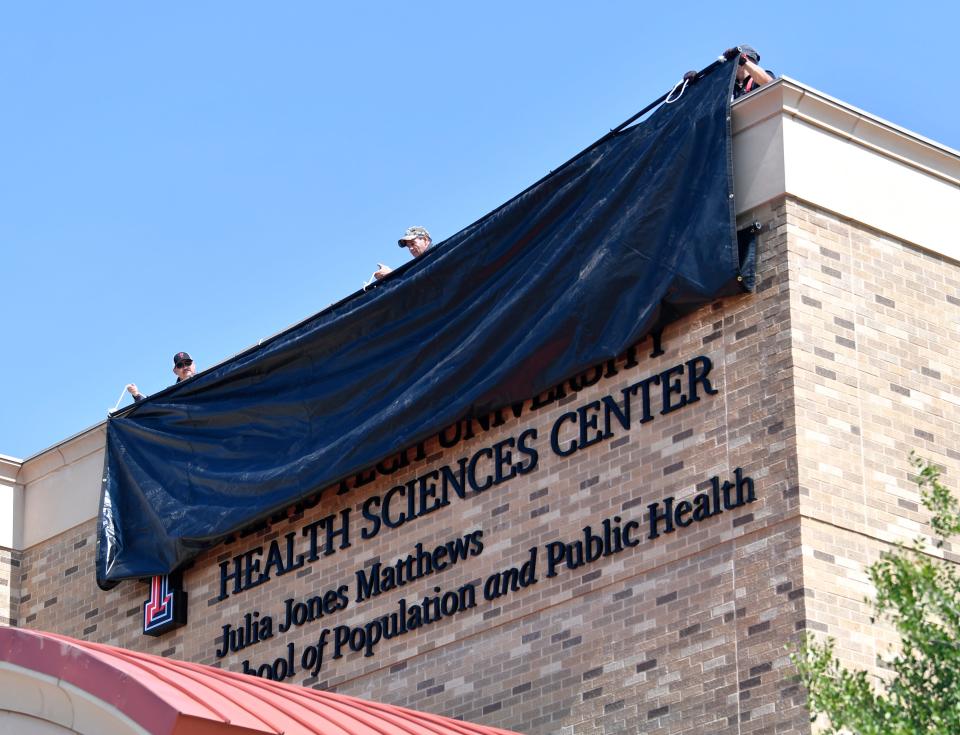Texas Tech honors Judy Matthews with Abilene health science school naming
Under blues skies and the sound of train horns sounding occasion sounding to the south on a still morning, a covering was pulled skyward Wednesday to reveal the Julia Jones Matthews School of Population and Public Health.
The school faces south at the Texas Tech University Health Sciences Center in northeast Abilene.

It opened in 2016 but now is named for Matthews, who died in November 2016 at 97.
"I am pleased ... but I am mainly happy for Abilene," son Kade Matthews said after the unveiling, standing with others in the shade of a tent erected in campus parking. "I know mom's pleased."
Though Matthews said the family has its share of Longhorns and Horned Frogs. and "we have one semi-Aggie ... and McMurry," they are all in for Tech.
"It's going to continue," he said of the university adding to the Abilene campus. "Hopefully, Tech will want to continue doing stuff here. I think over time, Tech is going to be the savior of West Texas."
Lorie Rice-Spearman, the ninth president of Tech's health center and the first female president in the Tech University System, affirmed Matthews' hopes.
"We are looking forward to the future of the (health sciences center) in this community," she said during her opening remarks. "We have a vision to continue to grow here, and build collaboration with our sister universities in this community so we can raise the status of health care in Abilene and our next frontier of research here in Abilene."
About the school
The six-year-old school serves a dual purpose, and its role in public health only increased during the pandemic that gripped West Texas and the world the past two years-plus.
First, it provides data through its population studies.
Secondly, through its public health mission, that data is applied to target prevention and intervention.
Dr. Billy Philips, acting dean for the Matthews School, said these are separate fields but "aligned. They are allies.
"In population health, we provide a scientific basis to discern patterns and approaches and interventions that are data-driven. It's evidence-based. It's the best we know of the science."
In public health, he said, "We take that information and practice that with community people and make changes that are life-saving. We are unique in the opportunity to influence all the way from prevention, so that nothing happens but good things."
Data gathers will work with public health officials in West Texas, and beyond, Rice-Spearman said.
Recognized in the audience Wednesday was Annette Lerma, director of public health for the city of Abilene. She has a master's degree in public health from Texas Tech.
Lerma had a key role in how Abilene dealt with COVID-19.
"She tireless in all the right ways, and diplomatic," Philips said. "She led during the hardest time I can think of. "

He noted community viewpoints have been "all over the place."
"It's going to take us all," he said.
"We all learned how important public health was during the last pandemic," Rice-Spearman said. "We relied on public health officials to guide us as communities to guide us on the way to making sure we were safety, secure and moving forward with the best information that we had at the time.
Phillips said that during his career, there have been nine pandemics. COVID, however, presented the greatest challenge.
All for 'One'
The Tech system is one of only nine in the U.S. to have a veterinary school, medical school and pharmacy school, and a law school.
Tech calls its effort "One Health."
"We are going to leverage that, and the Abilene community is going to be a part of that," Rice-Spearman said. The Matthews School will be a foundation, she said, of these parts coming together.
"We are excited about that foundation being here in Abilene, Texas."
The school occupies almost 45,000 square feet. The total campus is on 23 acres.
Philips recounted traveling with current Chancellor Tedd Mitchell to Abilene to meet with Lancaster and other officials. Mitchell first joined the TTU System in 2010 as the eighth president of TTUHSC, and later became Texas Tech University president.
"He said, 'Well, we're going to have a new school one of these days and I think we have a partnership to build," Philips said. "And you know what, I got to see that and be a part of that.
"Our long-term goal is to build out degreed programs in this school to get every graduate of any program in the university to come take a degree with us. It's a bold vision, but it's appropriate for the heart of Texas. We will achieve that and make the next work force for our communities."
Her lasting gift
It was Judy Matthews' interest in the Abilene community that helped fuel a local effort to bring Texas Tech to town, specifically with the construction of a medical campus.

Several years before she retired as president of the Dodge Jones Foundation in 2008, Matthews sought a final landmark project, Joe Canon, longtime executive director of the foundation told the Reporter-News in 2016.
"What could be her signature showcase project?" he said. "An enduring legacy for the community."
That effort became a health sciences school.
"She became focused on providing the initiative, resources and encouragement for that effort," Canon said at the time.
Tech's health campus opened here in 2007 with a pharmacy school.
The campus today includes a nursing school and a graduate school for biomedical sciences.
Attending Wednesday's ceremony were current Tech leaders and those who were involved in the effort to launch a health center in Abilene. Those included two former members of the Board of Regents, Scott Dueser (chairman, president and CEO of First Financial Bank) and Tim Lancaster (retired president and CEO of Hendrick Health System).
Also present was former Abilene mayor Norm Archibald, who was involved in the recruiting effort.
Rice-Spearman, said the Abilene campus has contributed $56.6 million to the local economy over its time here. About 500 are employed in some capacity, she said.

That, Rice-Spearman, shows fulfillment of the promise made almost 20 years when a campus was discussed and economic impact considered.
That wouldn't have happen without the vision of community leaders to champion health care in Abilene, Tech officials said.
The Dodge Jones, Dian Graves Owen and Shelton Family foundations were among the major players in the effort, as well as the Development Corporation of Abilene, Canon said Wednesday.
"These were the steadfast, continuing players during the development of the campus here," Canon acknowledged.
Part of the foundation
Philips noted the impact of Judy Matthews on the community during his trips to Abilene. He saw her handprint throughout the city.
Canon said that all started with transforming the T&P right-of-way, "a linear unsightly scar" across Abilene, through a beautification project.
"It was ugly," he said of the mass of red dirt, gravel and weeds.
"It can look better than it looks now," he said. "As soon as it rains."
Heads nodded with approval.
Other Matthews' efforts included The Grace Museum, Paramount Theatre restoration and getting Community Foundation of Abilene underway. Today, that funding hub has assets of $183 million, he said.
"The key legacy she imparted was to her children and her grandchildren - the spirit of philanthropy generosity and community service. That is what she demonstrated," Canon said.
And now, other businesses have taken roles to lead Abilene ahead.
"They are picking up that mantle," he said.
Still, it's the family that started it all and, with the naming of the Texas Tech school, is continuing to lead.
The family name is on two other prominent Abilene buildings - the Jones Wing at nearby Hendrick Medical Center is named for Percy and Ruth Legett Jones, while the Abilene ISD named its planetarium for railroader Morgan Jones. It has been open since 1968.
But only one bears Judy Matthews' name.
Greg Jaklewicz is editor of the Abilene Reporter-News and general columnist. If you appreciate locally driven news, you can support local journalists with a digital subscription to ReporterNews.com.
What is public heath?
Public health varies in every city, one reason being is needs of certain populations are different and different times. Overall, these are the focuses:
Control of infectious diseases
Safer and healthier foods
Motor vehicle safety
Family planning
Vaccinations
Safer workplaces
This article originally appeared on Abilene Reporter-News: TTUHSC Abilene names school after Judy Matthews
